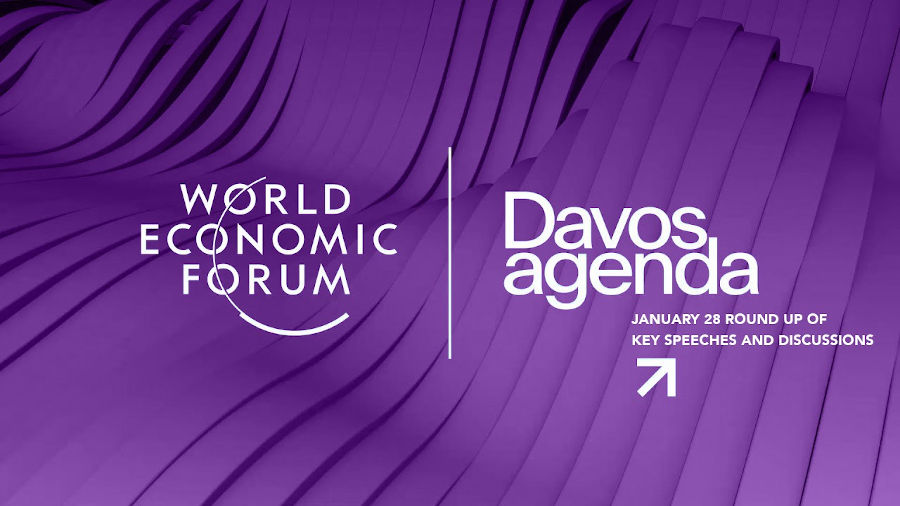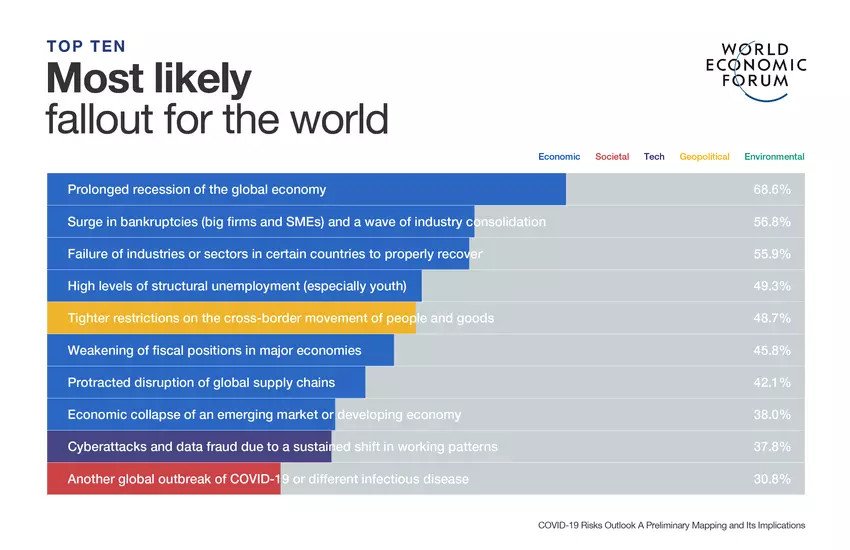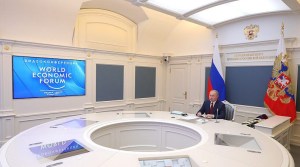World Economic Davos Forum 2021 : Agenda, Speeches, & Discussions: Daily Rolling Coverage – January 28 Highlights

January 28 Highlights
Updated daily
Compiled by Chris Devonshire-Ellis
- Special Addresses by Vladimir Putin, Moon Jae-in & Benjamin Netanyahu
- Sessions on Environmental Protection, Climate Change, New Technologies, Blue Oceans, Eco-systems and new Food Technologies
The World Economic Forum is taking place between January 25-29, and this year is being virtually. Over 2,000 Government, business and academic leaders are attending under the theme of “A Crucial Year to Rebuild Trust”, including 25 heads of state, and 600 global CEOs.
The World Economic Forum has released a chart of current global problems that the Davos meeting is expected to discuss. These can be seen here:

The theme for each day’s discussions has been planned and is as follows:
Monday January 25
“Designing cohesive, sustainable, resilient economic systems”
Tuesday January 26
“Driving responsible industry transformation and growth”
Wednesday January 27
“Enhancing stewardship of the global commons”
Thursday January 28
“Harnessing the technologies of the Fourth Industrial Revolution”
Friday January 29
“Advancing global and regional cooperation”
We will be bringing analysis and commentary of each day’s agenda during the week, with an Executive Summary next Monday, February 1st. To ensure you receive this, please obtain your complimentary subscription here
The World Economic Forum, or Davos (as it is usually held there) is an annual event often looked at for political signals between the larger nations. As such commentary involving China and the United States will be especially focused on with a new American President just in office amid the past two years of trade friction between the countries. However, apart from this major focal point, a great deal of effort will be spent on global, rather than bilateral challenges, and we shall be looking at the impact of these as opposed to purely the US-China rivalry. This feed will be updated daily.
Comments On Yesterday’s Davos Sessions, Wednesday January 28

The main theme of yesterday’s events was the Global Environment, and issues such as clean energy, transitioning to net-zero emissions, new technologies to harness energy and food supplies, blue Oceans, and innovative financing to support these changes.
The key address was by Russian President Putin, in which he warned that the world was entering into a fractious state not unlike the period between the two World Wars, that US ‘Big Tech’ was in danger of overcoming sovereign nations, while global corporations were retaining massive amounts of profits at the expense of the global community. He also reiterated calls for a renewed Russia-Europe partnership. His speech in full with an English transliteration can be read here and the video recording of it here.
South Korea’s President Moon Jae-in called for increased ‘profit sharing’ in the distribution of Covid-19 vaccines and for better cooperation between nations during global crisis’s, his speech may be viewed here, while Benjamin Netanyahu of Israel warned that the Covid-19 virus would take years to eradicate. He also took questions, a video of his speech and Q&A (mainly about Covid) can be seen here.
In terms of business and investment issues, the following subjects were the most applicable from yesterday’s sessions:
Accelerating Clean Energy Transitions
Accelerating the clean energy transition has become a global imperative as a key lever for economic recovery and addressing the climate emergency. What policies, practices and partnerships are needed to scale up clean energy investments in emerging economies?
Financing The Net-Zero Transition
The transformation of industries and economies to zero carbon emissions is complex and capital-intensive. Corporates must collaborate with the financial and public sectors to accelerate decarbonization. What innovative financing solutions are needed to accelerate progress towards a net-zero future?
Building A Path To Net-Zero Aviation
COVID-19 has all but decimated the aviation industry, creating ripple effects on economies across the globe. As the industry prepares to ramp up connectivity post-COVID, what policies, practices and partnerships are needed to reset the industry towards net-zero pathways?
Harnessing Circular Innovation For An Economic Reset
A circular economy transformation could create 700,000 net additional jobs by 2040 and generate savings of up to $200 billion a year. Yet, while a shift from the “take-make-waste” model is gaining momentum, an opportunity exists for a more ambitious system reset as society emerges from the pandemic. How can leaders scale up innovative solutions in plastics, electronics, food and more to accelerate the transition to a regenerative circular economy?
Harnessing Technology For Environmental Sustainability
From earth observation for forest conservation to deploying AI to reduce greenhouse gas emissions, technology underpins innovative solutions to tackle environmental challenges and achieve sustainable development priorities. What policies, practices and partnerships are needed to harness technology for environmental sustainability?
Scaling Carbon Markets (with Bill Gates)
With the full economic repercussions of the COVID-19 crisis looming, the scaling of carbon markets could offer opportunity for mobilizing additional finance for climate and nature action.
Unlocking Innovation To Transform Food Systems
From food-sensing technologies and blockchain-enabled traceability, to societal, science and business model innovation, all collectively present an unprecedented opportunity to transform food systems by 2030. What practices, policies and partnerships are needed to reset food systems to offer more inclusive, nutritious and healthy, environmentally sustainable and efficient futures for people and the planet?
Transforming Food Systems And Land Use In Asia
More than 1 billion tonnes of food are still wasted every year and agriculture remains a major driver of water use, climate change and nature loss. A nature-positive economy could create 395 million new jobs by 2030. With the Biodiversity COP15 and the UN Food Systems Summit scheduled for 2021, this Leadership Panel examines how to scale inclusive action to transform food systems, improve farmer livelihoods and restore nature.
Shaping A New Ocean Economy
The COVID-19 pandemic has exposed the fragility of ocean economies, most acutely felt in Small Island Developing States (SIDS). Yet these states encompass valuable ocean assets about 2,000 times the size of their land masses. From ocean finance to coastal resilience measures, what policies, practices and partnerships are needed to build back a more just and resilient ocean economy?
Sessions from Monday’s events included:
Keynote speech from Xi Jinping; Responding To The Covid-19 Crisis In Asia; Building Crisis-Resistant Healthcare Systems In A Post Covid World; Restoring Economic Growth; Building Net-Zero Cities; New Pathways To Economic Transformation; Developing The Evolution Of Stakeholder Capitalism, and Resetting Digital Currencies and can be accessed here.
Sessions from Tuesday’s events included
Special Address by Ursula von der Leyen (President, EU Commission); Special Address by Cyril Ramaphosa (President of South Africa); Speeches by Angela Merkel and Emmanuel Macron; and sessions: Re-Assessing Corporate Risks And Re-Inforcing Resilience; Strengthening The Financial & Monetary System; Designing Connected & Sustainable Value Chains; Reimagining Manufacturing For Growth; Rethinking Cities For A Post Covid Future; Resetting Consumption For A Sustainable Future and Preparing For Deglobalization and can be accessed here
Related Reading
- Asia Cooperation Dialogue, 17th Foreign Ministers’ Meeting: “The New Normal and Safe and Healthy Tourism”
- China’s Foreign Minister At The Belt & Road Forum For International Cooperation: Analysis Of Wang Yi’s Statements, And The Impact On China FDI & ODI In 2021.
About Us
Silk Road Briefing is written by Dezan Shira & Associates. The firm has 28 offices throughout Asia, and assists foreign investors into the region. For strategic advisory and business intelligence issues please contact the firm at silkroad@dezshira.com or visit www.dezshira.com





